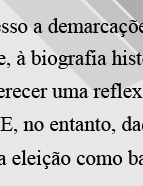

................................
2. "The Great and Humble". Recognising the potentially formative and even propagandistic dimension of the discourse on the past – with the biographical genre at the forefront – the community of historians was confronted with two situations that influenced both the public projection and the autonomy of the discipline in various ways: on the one hand, the dense presence of authors from other socio-professional areas in their specific field of work, or merely amateurs; and on the other hand, a publishing industry (also reflected in the school curricula) dominated by interpretations of "Fatherland" history with heavily ideological content. It is not that this clear predominance of history enthusiasts or self-taught individuals in publicisng went unanswered, especially those with global readings of Portuguese history. However, the gradual return of historians to the public arena after decades of relative isolation was not, and perhaps could not have been, free from ideological aspirations.
In that regard, it was not strange that this blend of erudition and dissemination should share a taste for the exemplary nature of particular figures. In the 1940s, for example, Lopes de Oliveira surrounded himself with a team of experienced biographers, who were not only writers but also legitimate historians, although not academic - such as Augusto Casimiro, Tomás da Fonseca, and Visconde de Lagoa - to publish an extensive work dedicated to "As Grandes Figuras da Humanidade" ["The Great Figures of Humanity"] where, according to the prevailing tastes and ideology, national figures stood out. Other works in the same spirit would follow. In the "História de Portugal" collection by the Empresa Nacional de Publicidade, for instance, which by the mid-century included university scholars, writers and erudite individuals of various backgrounds - such as Vieira de Almeida, Carlos Selvagem, Luís Chaves, and Mário Domingues - the programme aimed to reconstruct Portugal's most splendid eras through portraits of emblematic figures. Around the same time, but in this case in a clearly academic environment, Hernâni Cidade - himself a prolific author of literary biographies - would oversee a kind of national history in two substantial volumes, under the unequivocal title "Os grandes portugueses" ["Great Portuguese Men"]. Here, erudition was expressly placed at the service of popularisation, even among a relatively educated public with access to more rigorous volumes. In terms of publication, the distinct authorship justified the format since a significant portion of the Portuguese academic universe or its fringes could be found among the work's contributors: from Jaime Cortesão to António José Saraiva, Lindley Cintra, Borges de Macedo, Óscar Lopes, and José Mattoso, including, for the focus here, experienced biographers such as Torquato da Sousa Soares, Fidelino de Figueiredo, Francisco da Gama Caeiro, Ester de Lemos,and Mário Martins.
